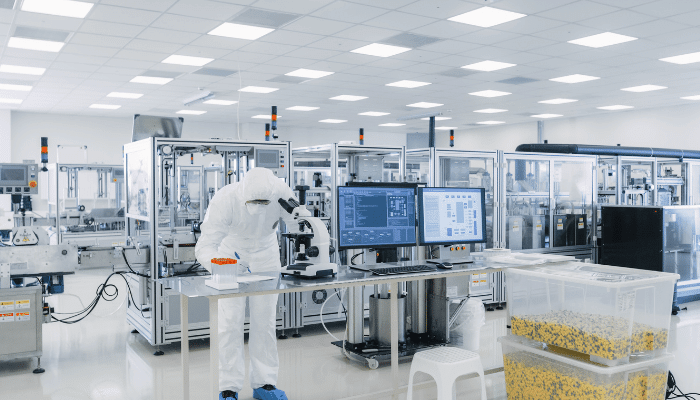Your Factory Floor Data Collection Process is More Important than You Might Think
How “Current” is Your Factory Floor Data Collection Process? Data runs our world today. Some of the largest and most successful companies that we see rely on enormous amounts of data to drive their business decisions. They base everything on data. Companies such as Facebook thrive off of gathering, analyzing, and acting on data they acquire from users. They know everything about the people using their platform- Where they live, where they’re from, where they worked, who their friends are, their interests, and they leverage this data for their advantage very successfully.
The same goes for the manufacturing industry. Just like how data runs our world, data runs the manufacturing industry. In recent years many companies have started to realize this. On the other hand, many companies have also deemed that modern systems that provide better and faster factory floor data are excessive, expensive, and unnecessary.
What do you think? And, what is your current process?
If You Aren’t Moving Forward, You’re Moving Backward
This quote applies to business especially. There is no treading water in business- you’re either going up or you’re going down. Furthermore, there is always (emphasis here) going to be someone willing to put in the effort to be better than you, do your job better, produce more products faster, do your job cheaper, and so on.
Competition is only growing, and if you want to get ahead or stay ahead, you have to keep innovating and keep moving forward.
The point that I am making, is that manual factory floor data collection is not cutting it anymore. Manual data entry sets you back, it’s outdated, and it consumes too much valuable time without providing sufficient value.
Manual Factory Floor Data Collection is like Carrying Around a Phonebook in Your Pocket
If you are still doing this today, sorry for calling you out. But chances are if I see you pulling out a phonebook to dial a phone number in public- you’re either A) really old, or B) That’s all I can think of, honestly there’s just no reason for this. Why? because it’s extremely inefficient, and there is a much better, widely available solution today. Even the most basic phones have a digital contact list that you can scroll through and make a call within a few seconds.
The question is, why would it be any different within the manufacturing industry? Why would manual data entry be an acceptable solution? I understand that you have to start somewhere and that investing in a real-time data solution such as an MES is a larger investment than a basic $100 phone. However, if you are innovating and trying to compete, this should at the least be a goal that your company is working towards. Start small, think big, but you have to start.
Work towards modernizing your system, strive to be ahead of the curve. The old ways of manufacturing and manual data entry might seem to be okay for right now today. With that being said, in the coming years when it’s standard to have a higher level of factory floor data collection and more efficient processes, it will be detrimental to the ones who choose to ignore.
What is Your Current Factory Floor Data Collection process?
Prepare yourself for a lot of questions here.
Where would you put yourself today? How do you currently collect data from the factory floor? Do you collect manually with pen and paper? Maybe a whiteboard reporting system? A starter kit that records some basic factory floor data for you? Or, are you more advanced, recording data with an IIoT or MES solution?
For whichever factory floor data collection process you are currently using, what are you doing to progress to the next step? Where does your data end up once it’s collected? Are you acting on the data you gather?
Are you content with your current process? Should you be content with your current process?
Here are some questions that you can ask yourself to help determine how efficient and detailed your current factory floor data collection process is:
- How long does your process take? Starting from gathering data, to making an adjustment, to determining whether that adjustment improved efficiency, did nothing, or decreased efficiency.
- Are you aware of your own biggest inefficiencies?
- Can you accurately determine where your downtime is coming from, and how much downtime you encounter in a period of time?
- Do you know your own biggest downtime reasons?
- How efficient or inefficient are your change-overs? (for products and people)
- Are your maintenance schedules optimal? How do you know?
- Does your factory produce excessive scrap and waste? Do you know how much?
- Is your data validated and accurate? Do you completely trust your own data?
Based on your answers to these questions, evaluate where you are today, and determine what your plan for the future should be.
The Best thing that You Can Do to Improve Your Companies Factory Floor Operations
I’ve previously mentioned that you should always be working towards improvement. A goal for factory floor data collection should be to end up with a solution that provides real-time visibility into the plant floor, with all of the data coming from one source, one version of the truth. The data should also be readily available to consume for each person within the organization.
With that being said, that is the goal for the technology. To keep moving forward, you have to equip yourself with the right tools. However the ultimate goal is more sales, and more revenue, right (You should be saying yes)? To advance in these areas you need to focus on your business challenge FIRST. Business challenge first, and leverage solving the technology challenge to be the catalyst to help you achieve your ultimate goal.
Establish a proactive data-driven culture among the people in your company. Encourage your employees to act on the data they see, use it to make real improvements, and use it again to gauge results.
Start Small, Think Big
Easier said than done, it’s an investment to move towards a real-time data solution. It should be carefully thought about and planned out before jumping to conclusions. With that being said, data is the future. An efficient process and solution for data collection can be extremely valuable for companies who utilize it correctly.
Start with a pilot project. Connect to just 1 or 2 machines. Start with gathering real-time data on 1 or 2 manufacturing processes on the plant floor, and go from there.
At Ectobox, we have been through this process numerous times, and we recommend that companies start out small with this type of project. To keep it very, very simple for this post, here is the process-
- Define the Business Challenge
- Start with a Small Project
- Prove the Value
- Scale when Appropriate
You don’t have to make a huge upfront investment, what is important though, is that you get started with proper and efficient data collection and take advantage of the technology available today. In doing so, you are preparing yourself for the future and ensuring that you don’t fall behind.






